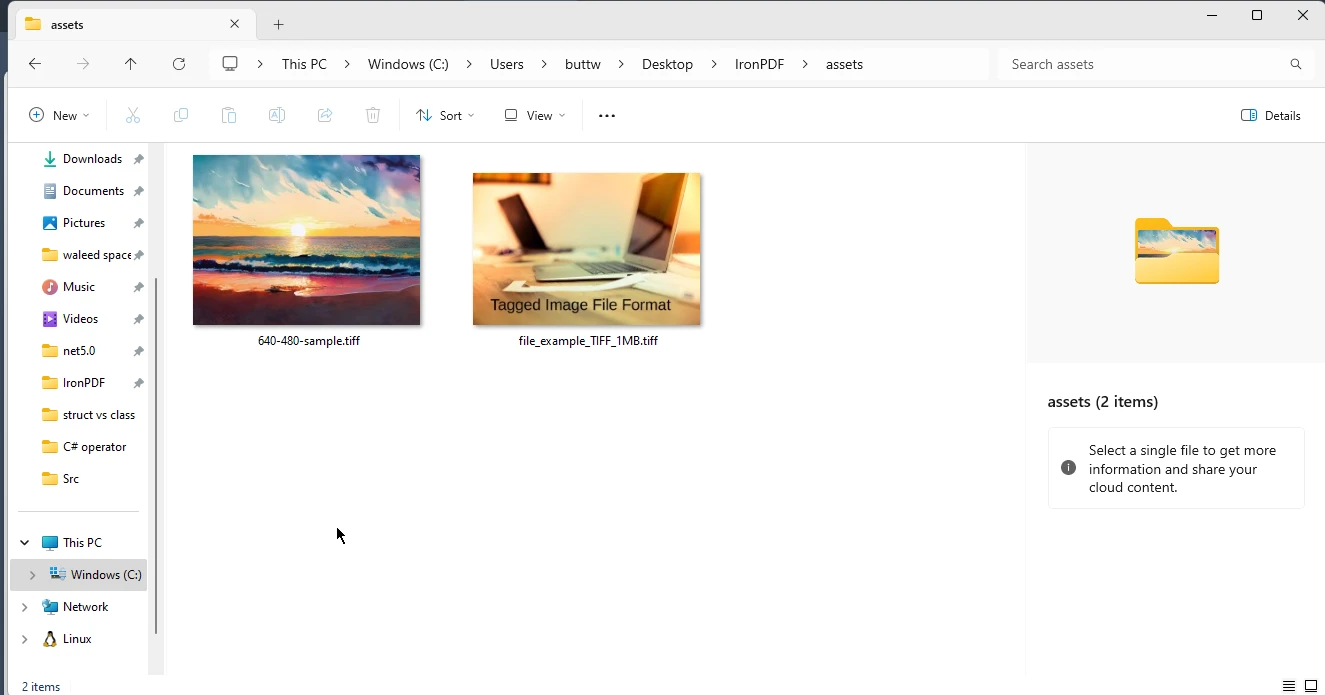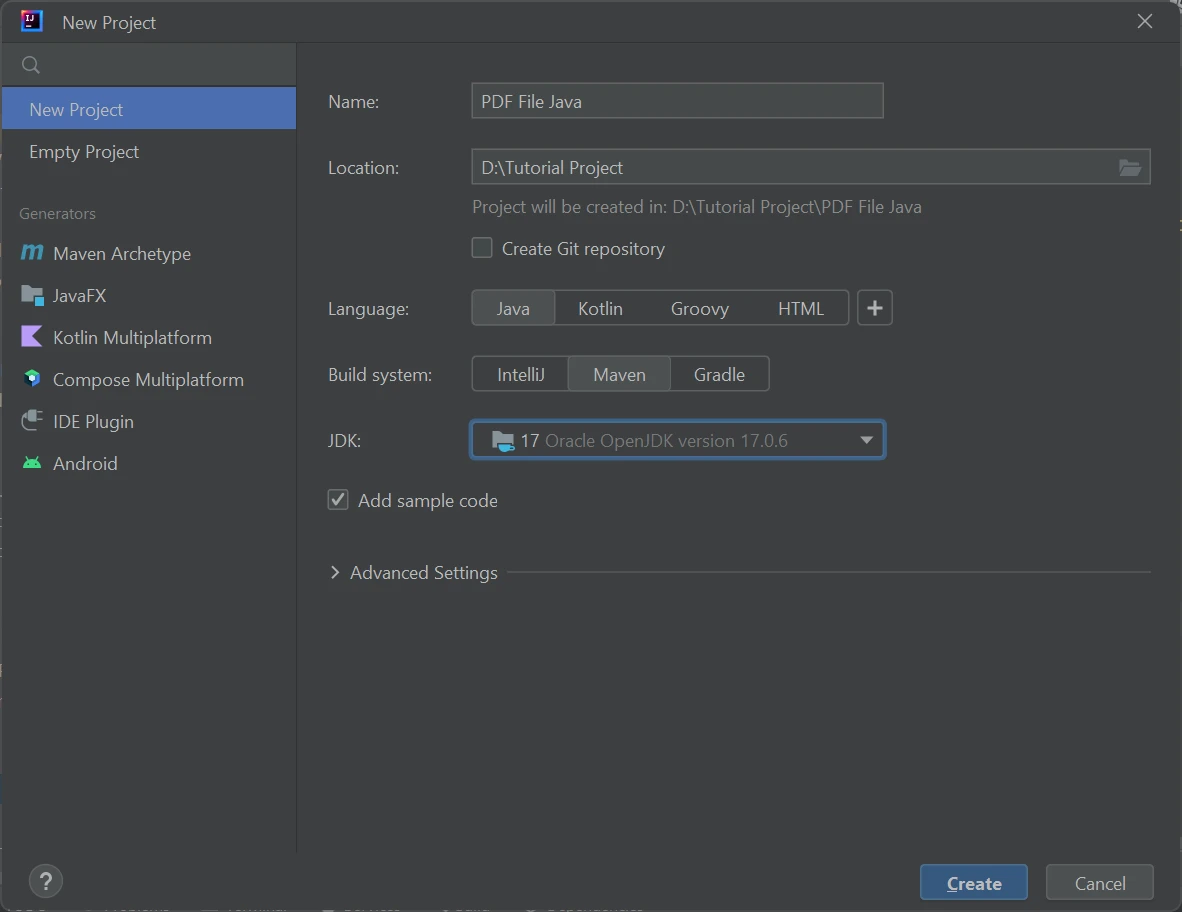How to Create a Table in a PDF Document Using Java (Tutorial)
This article will demonstrate how to create tables inside a PDF document using Java.
It is necessary to have a third-party library for creating tables in PDF documents using a Java program. There are multiple libraries available that can be used to create tables inside PDFs using a Java program. However, they can be expensive, challenging to use, or have performance issues. It can be tricky to find a library that is easy to use, free for development, and performs effectively.
IronPDF is one library that's very useful for manipulating PDF files. You can find more information about IronPDF by clicking on the IronPDF Official Java Page.
The following steps are covered in this article:
- Create a new project
- Install IronPDF Library
- Create a new PDF document
- Create a table for it
- Add dynamic values to the PDF document
Create a New Java Project
Open your preferred IDE. IntelliJ is recommended in this article, so the steps to create a new project may differ using another IDE.
Open IntelliJ IDE, click on File > New Project from the top menu bar. Name your project, select the location, language, build system, and JDK as shown below.
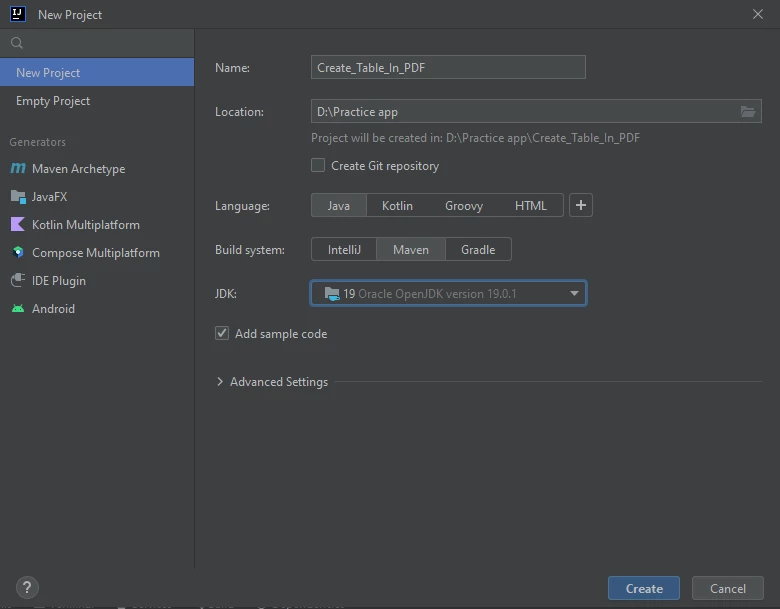 IntelliJ IDE New Project Window
IntelliJ IDE New Project Window
Click on the Create Project button, and a new project will be created.
Install IronPDF Library
Now, install the IronPDF library in the newly created project. Continue with the following steps.
Open the pom.xml file and add the necessary dependencies and repositories to use IronPDF. The specific content for the pom.xml is not provided in this article, but make sure to properly include the IronPDF library using Maven's dependency management.
<!-- Add IronPDF dependencies here -->
<dependencies>
<!-- Example dependency for IronPDF, actual group and artifact id to be retrieved from official documentation -->
<dependency>
<groupId>com.ironsoftware</groupId>
<artifactId>ironpdf</artifactId>
<version>VERSION_NUMBER</version>
</dependency>
</dependencies><!-- Add IronPDF dependencies here -->
<dependencies>
<!-- Example dependency for IronPDF, actual group and artifact id to be retrieved from official documentation -->
<dependency>
<groupId>com.ironsoftware</groupId>
<artifactId>ironpdf</artifactId>
<version>VERSION_NUMBER</version>
</dependency>
</dependencies>Type the following command into your terminal and press enter to install the specified Maven dependencies.
mvn installmvn installThis will install IronPDF in this project.
Add the following import statement for using IronPDF classes.
import com.ironsoftware.ironpdf.*;import com.ironsoftware.ironpdf.*;First of all, we will learn to create simple PDF documents in Java.
Create a PDF document
The following example code will create a new PDF document.
public static void main(String[] args) throws IOException {
// Create a PDF document from an HTML string
PdfDocument myPdf = PdfDocument.renderHtmlAsPdf("This is a sample PDF file");
try {
// Save the created PDF document to a file
myPdf.saveAs(Paths.get("html_saved.pdf"));
} catch (IOException e) {
throw new RuntimeException(e);
}
}public static void main(String[] args) throws IOException {
// Create a PDF document from an HTML string
PdfDocument myPdf = PdfDocument.renderHtmlAsPdf("This is a sample PDF file");
try {
// Save the created PDF document to a file
myPdf.saveAs(Paths.get("html_saved.pdf"));
} catch (IOException e) {
throw new RuntimeException(e);
}
}The renderHtmlAsPdf method takes a string as an argument and converts that string into an instance of a PDF document.
The saveAs function takes a file path as an argument and saves the newly created PDF document to the file path specified in the argument.
A PDF is created from the above code, shown in the following image.
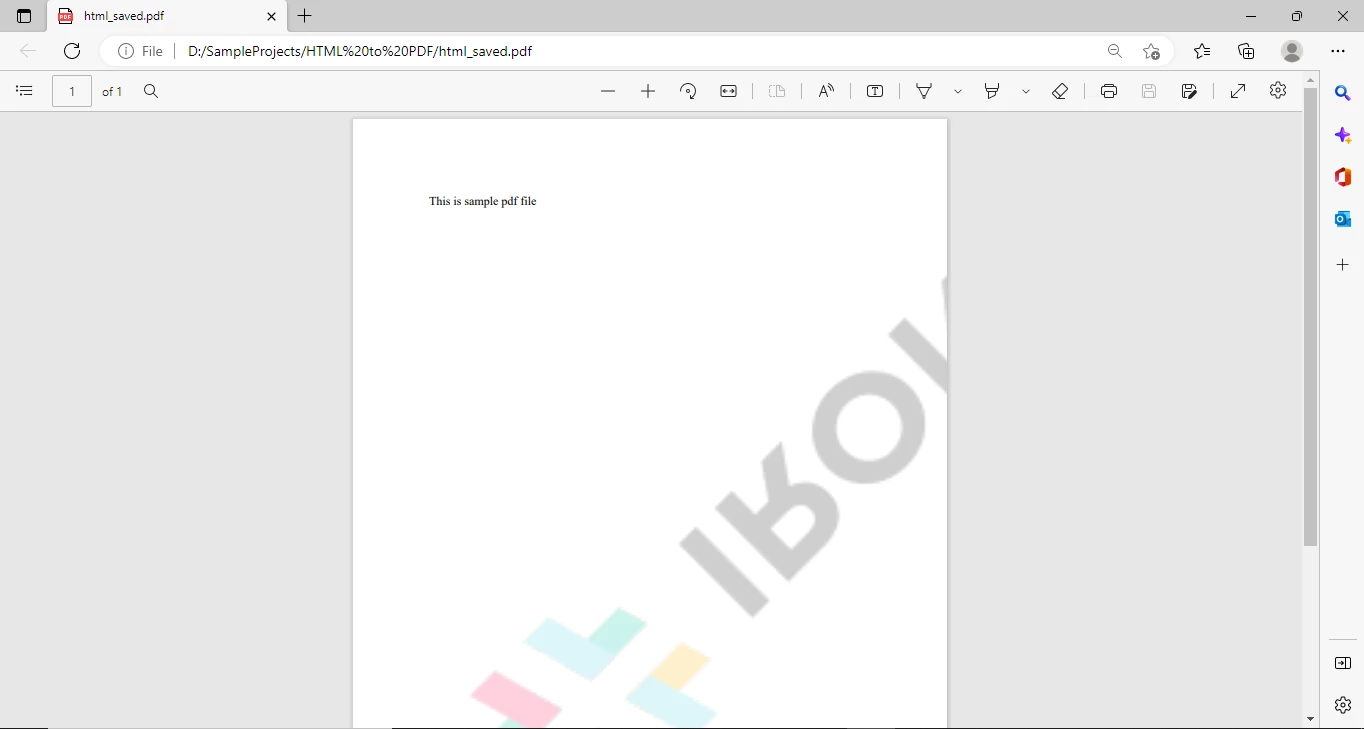 New PDF Document
New PDF Document
Create table for the PDF file
The following code will create a table in PDF.
public static void main(String[] args) throws IOException {
// HTML content for creating a table
String tableContent = "<table>\n" +
" <tr>\n" +
" <th>Company</th>\n" +
" <th>Contact</th>\n" +
" <th>Country</th>\n" +
" </tr>\n" +
" <tr>\n" +
" <td>Alfreds Futterkiste</td>\n" +
" <td>Maria Anders</td>\n" +
" <td>Germany</td>\n" +
" </tr>\n" +
" <tr>\n" +
" <td>Centro comercial Moctezuma</td>\n" +
" <td>Francisco Chang</td>\n" +
" <td>Mexico</td>\n" +
" </tr>\n" +
" <tr>\n" +
" <td>Ernst Handel</td>\n" +
" <td>Roland Mendel</td>\n" +
" <td>Austria</td>\n" +
" </tr>\n" +
" <tr>\n" +
" <td>Island Trading</td>\n" +
" <td>Helen Bennett</td>\n" +
" <td>UK</td>\n" +
" </tr>\n" +
" <tr>\n" +
" <td>Laughing Bacchus Winecellars</td>\n" +
" <td>Yoshi Tannamuri</td>\n" +
" <td>Canada</td>\n" +
" </tr>\n" +
" <tr>\n" +
" <td>Magazzini Alimentari Riuniti</td>\n" +
" <td>Giovanni Rovelli</td>\n" +
" <td>Italy</td>\n" +
" </tr>\n" +
"</table>";
// Create a PDF document with table content
PdfDocument myPdf = PdfDocument.renderHtmlAsPdf("<h1>Example of adding table in a PDF</h1>" + tableContent);
try {
// Save the created PDF document to a file
myPdf.saveAs(Paths.get("html_saved.pdf"));
} catch (IOException e) {
throw new RuntimeException(e);
}
}public static void main(String[] args) throws IOException {
// HTML content for creating a table
String tableContent = "<table>\n" +
" <tr>\n" +
" <th>Company</th>\n" +
" <th>Contact</th>\n" +
" <th>Country</th>\n" +
" </tr>\n" +
" <tr>\n" +
" <td>Alfreds Futterkiste</td>\n" +
" <td>Maria Anders</td>\n" +
" <td>Germany</td>\n" +
" </tr>\n" +
" <tr>\n" +
" <td>Centro comercial Moctezuma</td>\n" +
" <td>Francisco Chang</td>\n" +
" <td>Mexico</td>\n" +
" </tr>\n" +
" <tr>\n" +
" <td>Ernst Handel</td>\n" +
" <td>Roland Mendel</td>\n" +
" <td>Austria</td>\n" +
" </tr>\n" +
" <tr>\n" +
" <td>Island Trading</td>\n" +
" <td>Helen Bennett</td>\n" +
" <td>UK</td>\n" +
" </tr>\n" +
" <tr>\n" +
" <td>Laughing Bacchus Winecellars</td>\n" +
" <td>Yoshi Tannamuri</td>\n" +
" <td>Canada</td>\n" +
" </tr>\n" +
" <tr>\n" +
" <td>Magazzini Alimentari Riuniti</td>\n" +
" <td>Giovanni Rovelli</td>\n" +
" <td>Italy</td>\n" +
" </tr>\n" +
"</table>";
// Create a PDF document with table content
PdfDocument myPdf = PdfDocument.renderHtmlAsPdf("<h1>Example of adding table in a PDF</h1>" + tableContent);
try {
// Save the created PDF document to a file
myPdf.saveAs(Paths.get("html_saved.pdf"));
} catch (IOException e) {
throw new RuntimeException(e);
}
}The above code uses simple HTML tags to create a table in PDF using Java. So, to create a table, you must have basic knowledge of using HTML tags. Almost every Java programmer has knowledge of HTML, so it is very easy to create a new table and table cells using HTML tags.
The PDF file generated by this program is shown in the following image:
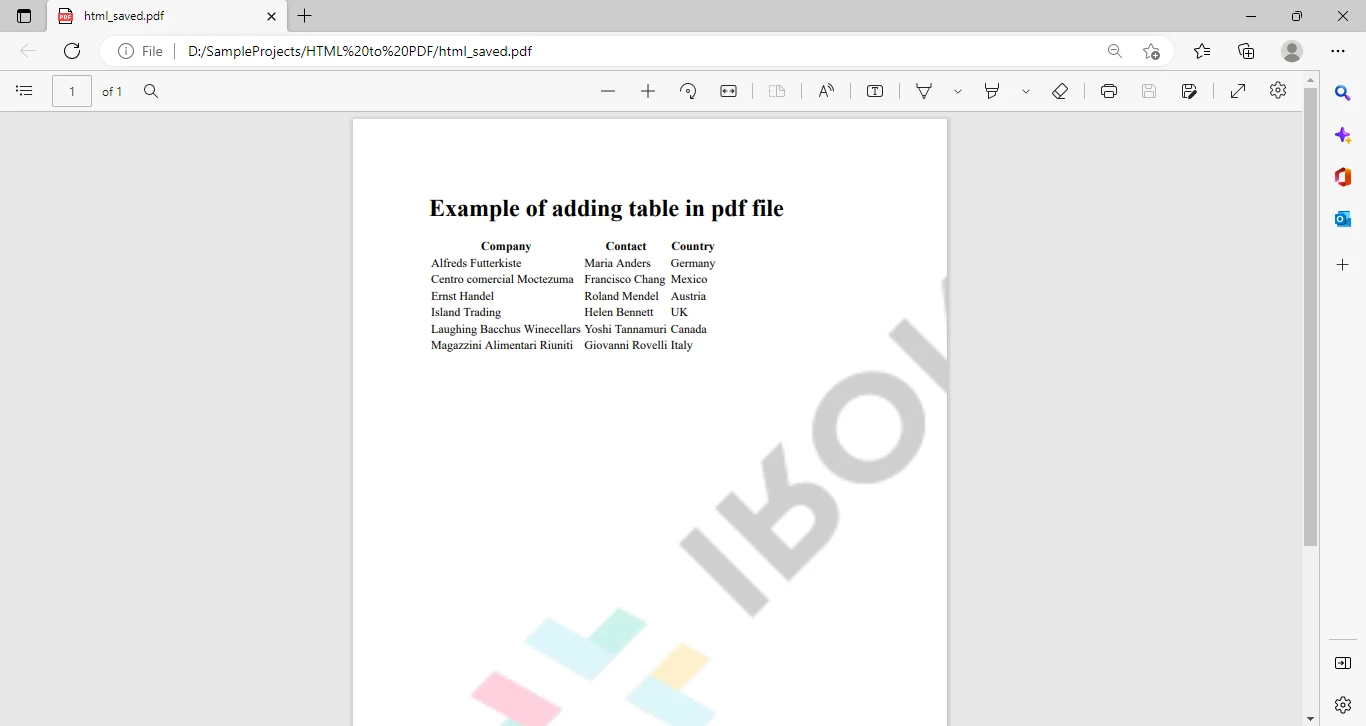 PDF document containing a table from HTML
PDF document containing a table from HTML
It's a simple table with no styling.
Now let's add some styling to this table, such as set table width, margin, layout, font, background color, and more.
Add Styling to the Table
The following sample code will format our table and add styling to our cells.
public static void main(String[] args) throws IOException {
// HTML and CSS content for styling the table
String htmlStyle = "<!DOCTYPE html>\n" +
"<html>\n" +
"<head>\n" +
"<style>\n" +
"table {\n" +
" font-family: arial, sans-serif;\n" +
" border-collapse: collapse;\n" +
" width: 100%;\n" +
"}\n" +
"\n" +
"td, th {\n" +
" border: 1px solid #dddddd;\n" +
" text-align: left;\n" +
" padding: 8px;\n" +
"}\n" +
"\n" +
"tr:nth-child(even) {\n" +
" background-color: #dddddd;\n" +
"}\n" +
"</style>\n" +
"</head>\n" +
"<body>";
String tableContent = "<table>\n" +
" <tr>\n" +
" <th>Company</th>\n" +
" <th>Contact</th>\n" +
" <th>Country</th>\n" +
" </tr>\n" +
" <tr>\n" +
" <td>Alfreds Futterkiste</td>\n" +
" <td>Maria Anders</td>\n" +
" <td>Germany</td>\n" +
" </tr>\n" +
" <tr>\n" +
" <td>Centro comercial Moctezuma</td>\n" +
" <td>Francisco Chang</td>\n" +
" <td>Mexico</td>\n" +
" </tr>\n" +
" <tr>\n" +
" <td>Ernst Handel</td>\n" +
" <td>Roland Mendel</td>\n" +
" <td>Austria</td>\n" +
" </tr>\n" +
" <tr>\n" +
" <td>Island Trading</td>\n" +
" <td>Helen Bennett</td>\n" +
" <td>UK</td>\n" +
" </tr>\n" +
" <tr>\n" +
" <td>Laughing Bacchus Winecellars</td>\n" +
" <td>Yoshi Tannamuri</td>\n" +
" <td>Canada</td>\n" +
" </tr>\n" +
" <tr>\n" +
" <td>Magazzini Alimentari Riuniti</td>\n" +
" <td>Giovanni Rovelli</td>\n" +
" <td>Italy</td>\n" +
" </tr>\n" +
"</table>\n</body>\n" +
"</html>";
// Create a PDF document with styled table content
PdfDocument myPdf = PdfDocument.renderHtmlAsPdf(htmlStyle + "Sample PDF" + tableContent);
try {
// Save the created PDF document to a file
myPdf.saveAs(Paths.get("html_saved.pdf"));
} catch (IOException e) {
throw new RuntimeException(e);
}
}public static void main(String[] args) throws IOException {
// HTML and CSS content for styling the table
String htmlStyle = "<!DOCTYPE html>\n" +
"<html>\n" +
"<head>\n" +
"<style>\n" +
"table {\n" +
" font-family: arial, sans-serif;\n" +
" border-collapse: collapse;\n" +
" width: 100%;\n" +
"}\n" +
"\n" +
"td, th {\n" +
" border: 1px solid #dddddd;\n" +
" text-align: left;\n" +
" padding: 8px;\n" +
"}\n" +
"\n" +
"tr:nth-child(even) {\n" +
" background-color: #dddddd;\n" +
"}\n" +
"</style>\n" +
"</head>\n" +
"<body>";
String tableContent = "<table>\n" +
" <tr>\n" +
" <th>Company</th>\n" +
" <th>Contact</th>\n" +
" <th>Country</th>\n" +
" </tr>\n" +
" <tr>\n" +
" <td>Alfreds Futterkiste</td>\n" +
" <td>Maria Anders</td>\n" +
" <td>Germany</td>\n" +
" </tr>\n" +
" <tr>\n" +
" <td>Centro comercial Moctezuma</td>\n" +
" <td>Francisco Chang</td>\n" +
" <td>Mexico</td>\n" +
" </tr>\n" +
" <tr>\n" +
" <td>Ernst Handel</td>\n" +
" <td>Roland Mendel</td>\n" +
" <td>Austria</td>\n" +
" </tr>\n" +
" <tr>\n" +
" <td>Island Trading</td>\n" +
" <td>Helen Bennett</td>\n" +
" <td>UK</td>\n" +
" </tr>\n" +
" <tr>\n" +
" <td>Laughing Bacchus Winecellars</td>\n" +
" <td>Yoshi Tannamuri</td>\n" +
" <td>Canada</td>\n" +
" </tr>\n" +
" <tr>\n" +
" <td>Magazzini Alimentari Riuniti</td>\n" +
" <td>Giovanni Rovelli</td>\n" +
" <td>Italy</td>\n" +
" </tr>\n" +
"</table>\n</body>\n" +
"</html>";
// Create a PDF document with styled table content
PdfDocument myPdf = PdfDocument.renderHtmlAsPdf(htmlStyle + "Sample PDF" + tableContent);
try {
// Save the created PDF document to a file
myPdf.saveAs(Paths.get("html_saved.pdf"));
} catch (IOException e) {
throw new RuntimeException(e);
}
}The added CSS is used for styling the table in the PDF. Hence, it is very efficient to use CSS for styling as needed.
Following is the PDF generated by this program.
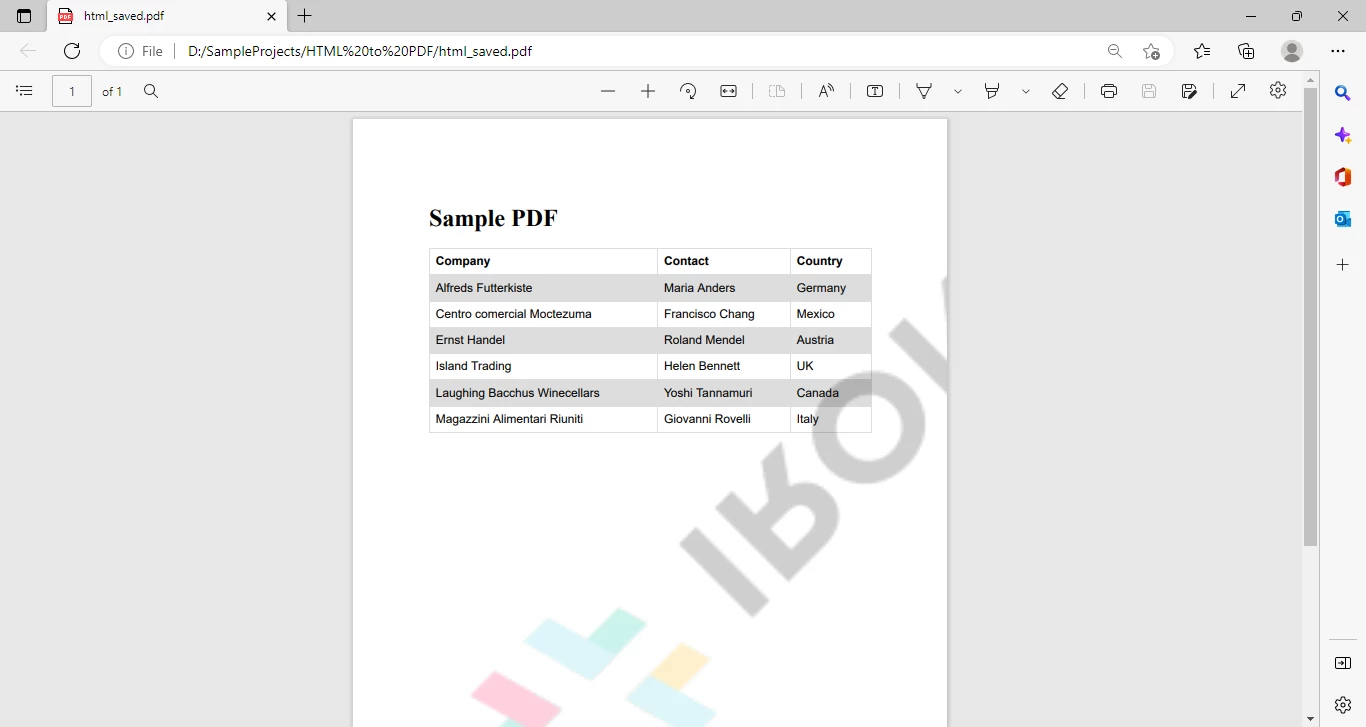 PDF document containing a table from HTML and styled with CSS
PDF document containing a table from HTML and styled with CSS
This above code looks very messy. But it can be cleaned by moving all the HTML content into an HTML file and then generating the PDF from that file.
Create a table using an HTML file in PDF using Java
Create a new HTML file and add all your HTML content to that file as shown below:
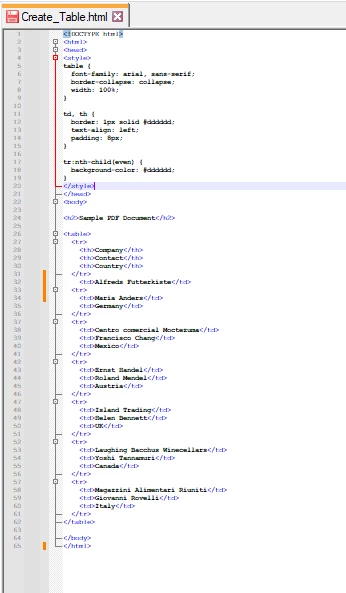 HTML moved into its own HTML file
HTML moved into its own HTML file
Add the following code to the Java program.
// Create a PDF document from an HTML file
PdfDocument myPdf = PdfDocument.renderHtmlFileAsPdf("Create_Table.html");
try {
// Save the created PDF document to a file
myPdf.saveAs(Paths.get("html_saved.pdf"));
} catch (IOException e) {
throw new RuntimeException(e);
}// Create a PDF document from an HTML file
PdfDocument myPdf = PdfDocument.renderHtmlFileAsPdf("Create_Table.html");
try {
// Save the created PDF document to a file
myPdf.saveAs(Paths.get("html_saved.pdf"));
} catch (IOException e) {
throw new RuntimeException(e);
}We can see how easy it is to generate a PDF using an HTML document. If you need to create PDF files in Java, the easiest way is to create a separate HTML document with content and styling and then just convert your HTML document into PDF with a single line of code.
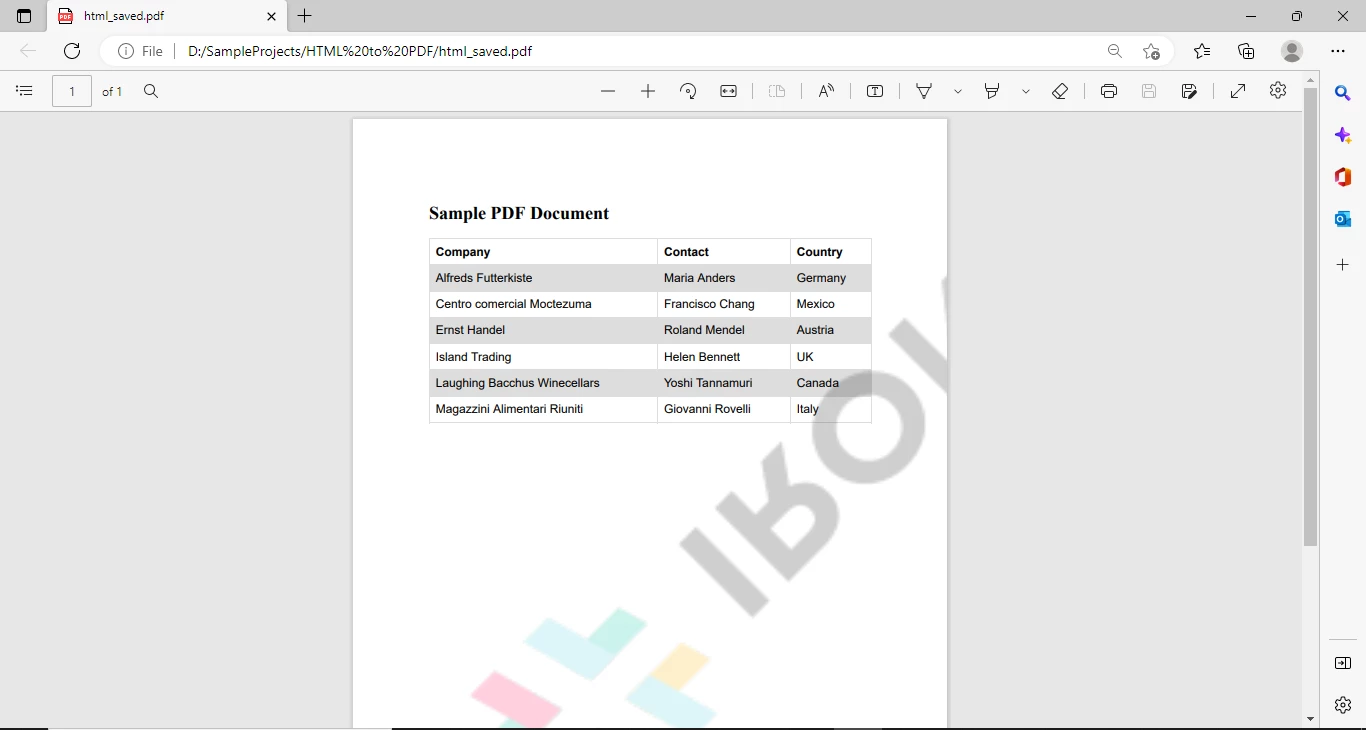 Final PDF document with styling
Final PDF document with styling
Summary
This tutorial demonstrated how to create a styled table in a PDF file using Java and learned to convert HTML files into PDF files. IronPDF for Java also offers functionality to add images to the PDF file, split PDF files, add headers and footers, apply digital signatures, and much more. Explore IronPDF Documentation to learn more about these features and additional capabilities.
Remove the IronPDF watermark from your generated PDF documents by purchasing a license key or by registering for a free trial.
Frequently Asked Questions
How can I start a new Java project for creating PDFs?
To start a new Java project for creating PDFs, you can use an IDE like IntelliJ. Begin by setting up the project and installing the IronPDF library via Maven to handle PDF creation and manipulation.
What steps are involved in converting HTML content to a PDF in Java?
To convert HTML content to a PDF in Java, you can use IronPDF's PdfDocument.renderHtmlAsPdf method. This involves writing your HTML content, optionally styling it with CSS, and rendering it into a PDF.
Can I use CSS to style tables in PDFs generated with Java?
Yes, you can use CSS to style tables in PDFs by including the CSS within the HTML content before rendering it into a PDF using IronPDF. This allows you to define fonts, borders, colors, and more.
How do I create a PDF from an external HTML file using Java?
To create a PDF from an external HTML file in Java, you can use IronPDF's PdfDocument.renderHtmlFileAsPdf method, which converts the entire HTML file into a PDF document.
What are the benefits of using a third-party library for PDF creation in Java?
Using a third-party library like IronPDF simplifies the process of PDF creation in Java, offering features such as HTML to PDF conversion, table styling, and additional functionalities like image and digital signature support.
How can I include images in a PDF document using Java libraries?
You can include images in a PDF document by embedding them within the HTML content that you render into a PDF using IronPDF. This method allows for seamless incorporation of visual elements.
What options are available for splitting PDFs in Java?
IronPDF offers options to split PDFs, allowing you to divide a single PDF into multiple documents. This feature can be particularly useful for managing large documents or extracting specific sections.
How can I apply digital signatures to PDFs using Java?
You can apply digital signatures to PDFs by using IronPDF's built-in features, which support the addition of digital signatures to enhance document security and authenticity.
What should I do if there is a watermark on my PDF documents?
If there is a watermark on your PDF documents created with IronPDF, you can remove it by purchasing a license key or by registering for a free trial license.


